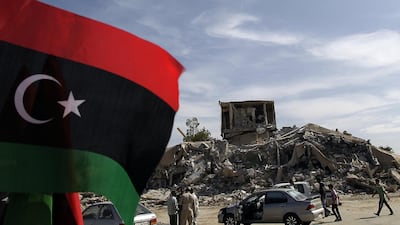At a key point during last week's Berlin II negotiations on Libya's political future, Turkey's foreign minister intervened to deal a blow to the communique as the conference concluded.
In the long oak-panelled room in a leafy part of the German capital, Mevlut Cavusoglu targeted Article V on the withdrawal of foreign troops from the country. The result was a single footnote to the entire document. “[1] Turkey introduced a reservation,” it said.
Officials who attended the meeting said Turkey insisted that its military forces in Libya enjoy exceptional status with a formal invite from the governing authorities preceding the current interim government. Turkey makes a distinction between these troops and the mercenaries – many of them Syrian rebel militia members it has flown there and directed in frontline fighting.
Few need to be convinced that the Turkish government was flat out keeping its toehold in Libya. At a time when the whole Libyan diplomatic process is posited on the removal of foreign forces, Turkey is a stumbling block. After all, the clock is ticking on pledges to hold elections under a new constitution on December 24.
Amid the turmoil since the demise of Col Muammar Qaddafi, Libya has suffered two fundamental challenges: the encroachment on its sovereign ability to run its own affairs and a spread of extremist militias.
For once in a sorry decade, there is more than a sliver of hope in Libya. The German government has worked hard through the Berlin meetings in 2020 and 2021 to put the political process back together. Jan Kubis, the UN Secretary General's special envoy, has gained valuable backing for his efforts through the Libyan Political Dialogue Forum.
There have been false dawns. Even compared with the elections in 2012 for Libya’s national congress and those in 2014 for the House of Representatives, the current process is admittedly still in the gestation phase. The perils of trying to cobble together a national government from a peace accord process has already been illustrated in the failed 2015 negotiations in Morocco.
All the factions in Libya can somehow trace their authority – such that it is – from one of these episodes. All are now pretty much exhausted entities. That has given an opening to the interim government to work with the diplomats for a new start for the country.

Turkey appears wedded to the old structures that allowed it a landing point in Libya. Foreign Minister Najla Mangoush wants to see the withdrawal right away. When she last said that, government buildings were occupied in Tripoli in a clear act of intimidation.
Turkey sees a period of bartering ahead. Either directly with Russia or through diplomatic circles supporting the interim government, it could withdraw 300-odd Syrian mercenaries in return for a like-for-like concession.
The Turks, however, can count on a certain weariness on the side of others who nevertheless might see this as a tangible first step. After all, the UN Security Council's call for an immediate withdrawal of foreign forces hasn't worked. Neither has the 2020 ceasefire agreement's 90-day deadline for withdrawal.
In the clashes in the state room in Berlin, Mr Cavusoglu made several efforts for expanded language protecting the Turkish troop presence. His first push would have applied to the withdrawal of mercenaries only. Having failed to gain traction for that open door, the Turkish foreign minister moved for additional language to say that the withdrawal should be aligned with the terms of the ceasefire agreement thrashed out in Tunisia last year. That was rejected, too. The conclusions went ahead with the square brackets footnote above stuck at the end.
What the development demonstrated was how the energy behind the reconciliation process can be sapped by just one heavyweight player.
Turkey seeks not only to keep its uniformed presence on the ground in Tripoli and Misurata. It has also carved up the eastern Mediterranean basin by agreeing a deal for a common exclusive economic area in a Maritime Boundary Treaty it agreed with the defunct Government of National Accord last year. The European Parliament Research Service produced a report saying that the deal was breaking with republican tradition of Kemal Ataturk in Turkish foreign policy and a return to the imperial overreach that typical of the erstwhile Ottoman Empire.
“The Turkey-Libya MoU effectively drew a dividing line between the eastern and western parts of the Mediterranean, threatening maritime security, natural gas exploration and new infrastructures such as the EastMed pipeline,” it said. “Turkey's behaviour, beyond its geoeconomic interests, reflects a more ambitious geopolitical 'neo-Ottoman' agenda intent on remodelling the whole region by spreading the country's influence from northern Iraq and Syria to Libya and leaving behind the Kemalist tradition of secularism and regional neutrality.”

The opportunity for driving a solution in Libya is open. The moment is a good test of US President Joe Biden's claims to offer serious and well thought out leadership. What it will take is pressure to stand up for the principles of the Libyan state governing itself as a grown-up regional actor.
After Berlin, Libya's Interim Prime Minister Abdul Hamid Dbeibah travelled to Downing Street to meet UK Prime Minister Boris Johnson. The two men were reported to have discussed the return of a looted statue of the goddess Persephone to Libya, which in its own way is an act of normalisation.
According to Greek legend, Persephone straddles the seasonal turning points between darkness and light. She escaped the underworld to bring the bounty of harvests but when the season changed, she had to return to hell.
That is as good as any summation of Libya’s recent course. Turkey is a deadweight on its efforts to escape a dark period in its history.
Damien McElroy is the London bureau chief at The National


